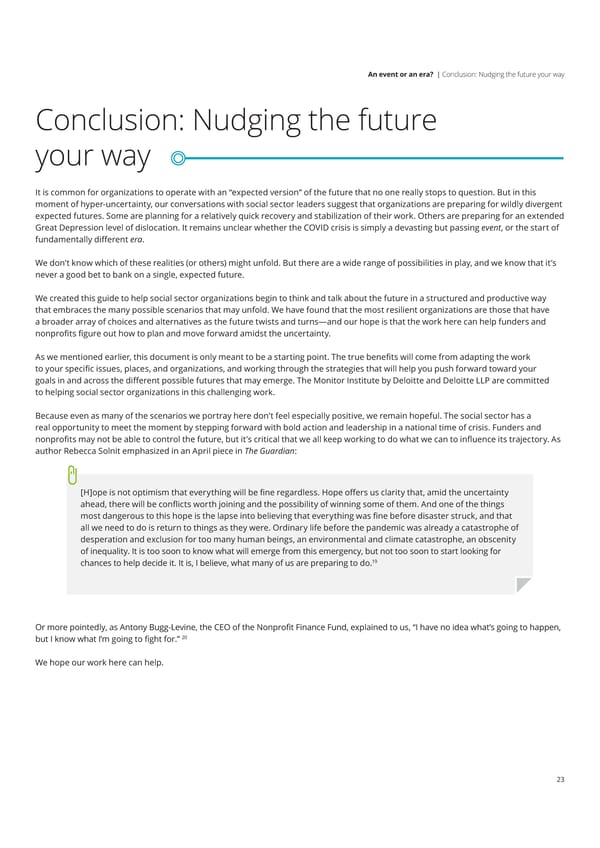An event or an era? | Conclusion: Nudging the future your way Conclusion: Nudging the future your way It is common for organizations to operate with an “expected version” of the future that no one really stops to question. But in this moment of hyper-uncertainty, our conversations with social sector leaders suggest that organizations are preparing for wildly divergent expected futures. Some are planning for a relatively quick recovery and stabilization of their work. Others are preparing for an extended Great Depression level of dislocation. It remains unclear whether the COVID crisis is simply a devasting but passing event, or the start of fundamentally different era. We don’t know which of these realities (or others) might unfold. But there are a wide range of possibilities in play, and we know that it’s never a good bet to bank on a single, expected future. We created this guide to help social sector organizations begin to think and talk about the future in a structured and productive way that embraces the many possible scenarios that may unfold. We have found that the most resilient organizations are those that have a broader array of choices and alternatives as the future twists and turns—and our hope is that the work here can help funders and nonprofits figure out how to plan and move forward amidst the uncertainty. As we mentioned earlier, this document is only meant to be a starting point. The true benefits will come from adapting the work to your specific issues, places, and organizations, and working through the strategies that will help you push forward toward your goals in and across the different possible futures that may emerge. The Monitor Institute by Deloitte and Deloitte LLP are committed to helping social sector organizations in this challenging work. Because even as many of the scenarios we portray here don’t feel especially positive, we remain hopeful. The social sector has a real opportunity to meet the moment by stepping forward with bold action and leadership in a national time of crisis. Funders and nonprofits may not be able to control the future, but it’s critical that we all keep working to do what we can to influence its trajectory. As author Rebecca Solnit emphasized in an April piece in The Guardian: [H]ope is not optimism that everything will be fine regardless. Hope offers us clarity that, amid the uncertainty ahead, there will be conflicts worth joining and the possibility of winning some of them. And one of the things most dangerous to this hope is the lapse into believing that everything was fine before disaster struck, and that all we need to do is return to things as they were. Ordinary life before the pandemic was already a catastrophe of desperation and exclusion for too many human beings, an environmental and climate catastrophe, an obscenity of inequality. It is too soon to know what will emerge from this emergency, but not too soon to start looking for 19 chances to help decide it. It is, I believe, what many of us are preparing to do. Or more pointedly, as Antony Bugg-Levine, the CEO of the Nonprofit Finance Fund, explained to us, “I have no idea what’s going to happen, 20 but I know what I’m going to fight for.” We hope our work here can help. 23
 US Deloitte Monitor Institute Page 22 Page 24
US Deloitte Monitor Institute Page 22 Page 24